This edition of monthly book reviews contains a little of everything—memoir, parenting, cooking, feel-good stories, mystery, historical fiction, and more. There are lots of books here, so lets get right to the reviews!
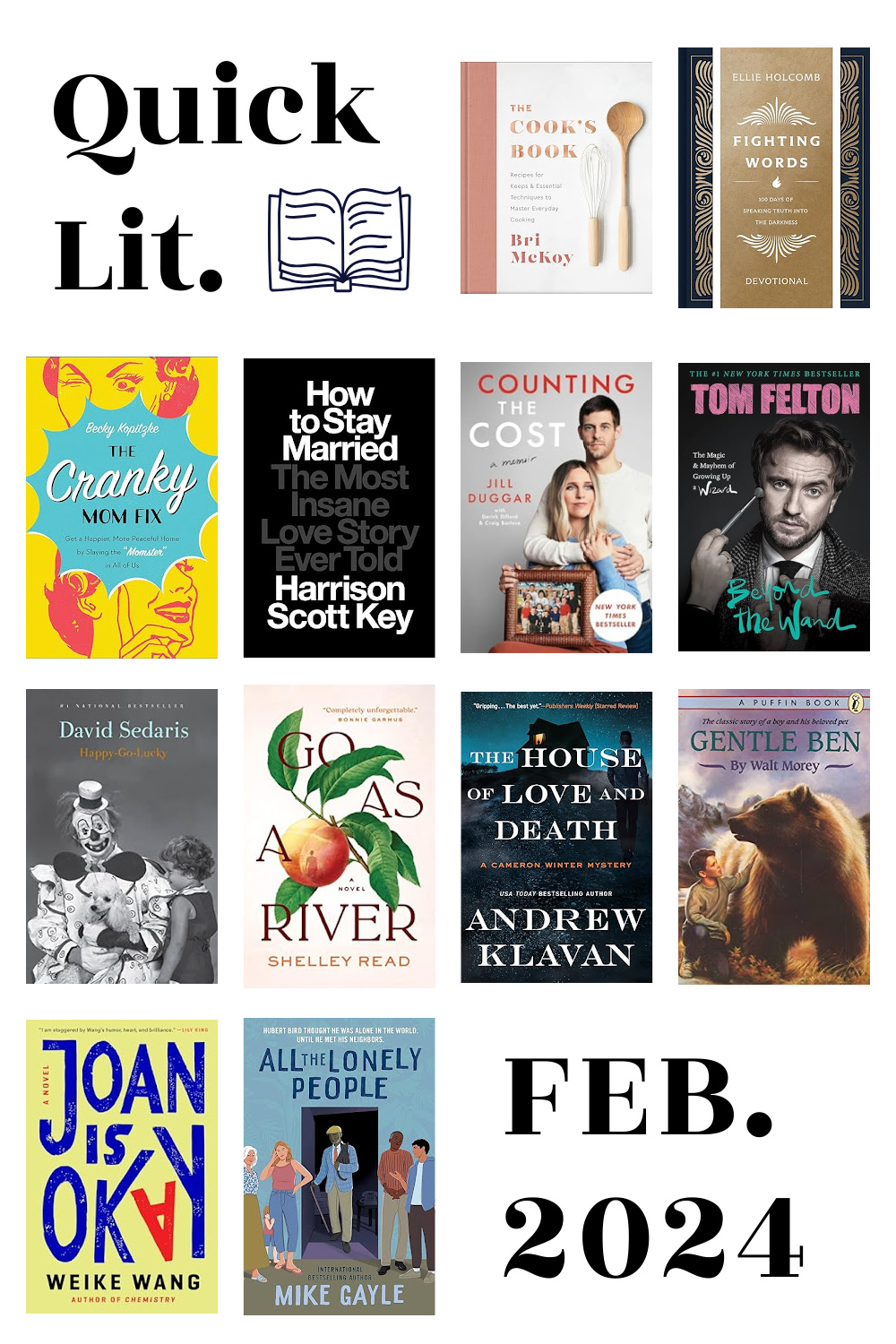
NONFICTION
Counting the Cost, by Jill Duggar: Growing up as one of nineteen kids in the now-famous Duggar family, Jill Duggar never questioned their unusual lifestyle choices (lots of kids, no pants or music or dancing, strict obedience to parental and church authority) or her parents’ love and commitment to their children’s best interest. Jill complied with the family rules and didn’t object to the intrusive cameras that suddenly became part of their regular lives when she was a teen. But after marrying her husband Derrick and attempting to establish a new life for themselves as missionaries and new parents, Jill began to realize that her family was not as perfect as she’d always believed. From her older brother’s sexual scandals to her father’s mishandling of the family finances, as well as her parents’ refusal to acknowledge Jill’s boundaries or accept her slowly-shifting convictions, Jill started to see that her place in the Duggar family was no longer as joyful or secure as it had once been. In Counting the Cost, Jill documents her evolution from compliant daughter to confident woman, able to form her own beliefs and ideas and stand up to what she now saw to be wrong.
As I mentioned after reading Becoming Free Indeed (by Jill’s younger sister Jinger), I never watched the Duggars’ reality show and was only vaguely aware of their family. But Jinger’s book captured my interest and left me wanting to know more about this unusual and obviously broken family. Whereas Jinger’s book was more faith narrative, this is really a tell-all of the wrongs Jill suffered on behalf of her family (mostly her father, and mostly in the years since her marriage). Jill honors the good parts of her family and upbringing but holds nothing back in disclosing the cruelty and wrongs she also experienced. There is plenty of scandal here that saddened me and reaffirmed my dislike and distrust of reality television and influencer culture. It was especially difficult to see the wrongs done in the name of Christianity, even though the Duggars’ brand of “Christianity” is not at all Biblical or true (sadly, this probably is not apparent to most non-Christians watching in from the outside).
I admire Jill’s willingness to reevaluate her past as well as her eagerness to maintain some form of (healthier) relationship with her family, and I commend her ability to cling to God while separating from the cultish faith of her youth. I’m not sure how I feel about books like this one that “air out a family’s dirty laundry” in this way, but after having her life on display against her wishes, I can understand Jill’s desire to finally share her version of the story in her own way. That said, I do think this story would have benefitted from a few more years’ reflection; I understand the need to capitalize on media momentum for the sake of book sales, but I really wish more memoirists allowed extra time and space before rushing to publish their stories.
My Rating: 3.5 Stars (Rounded to 3 Stars on Goodreads) // Book Format: Audiobook
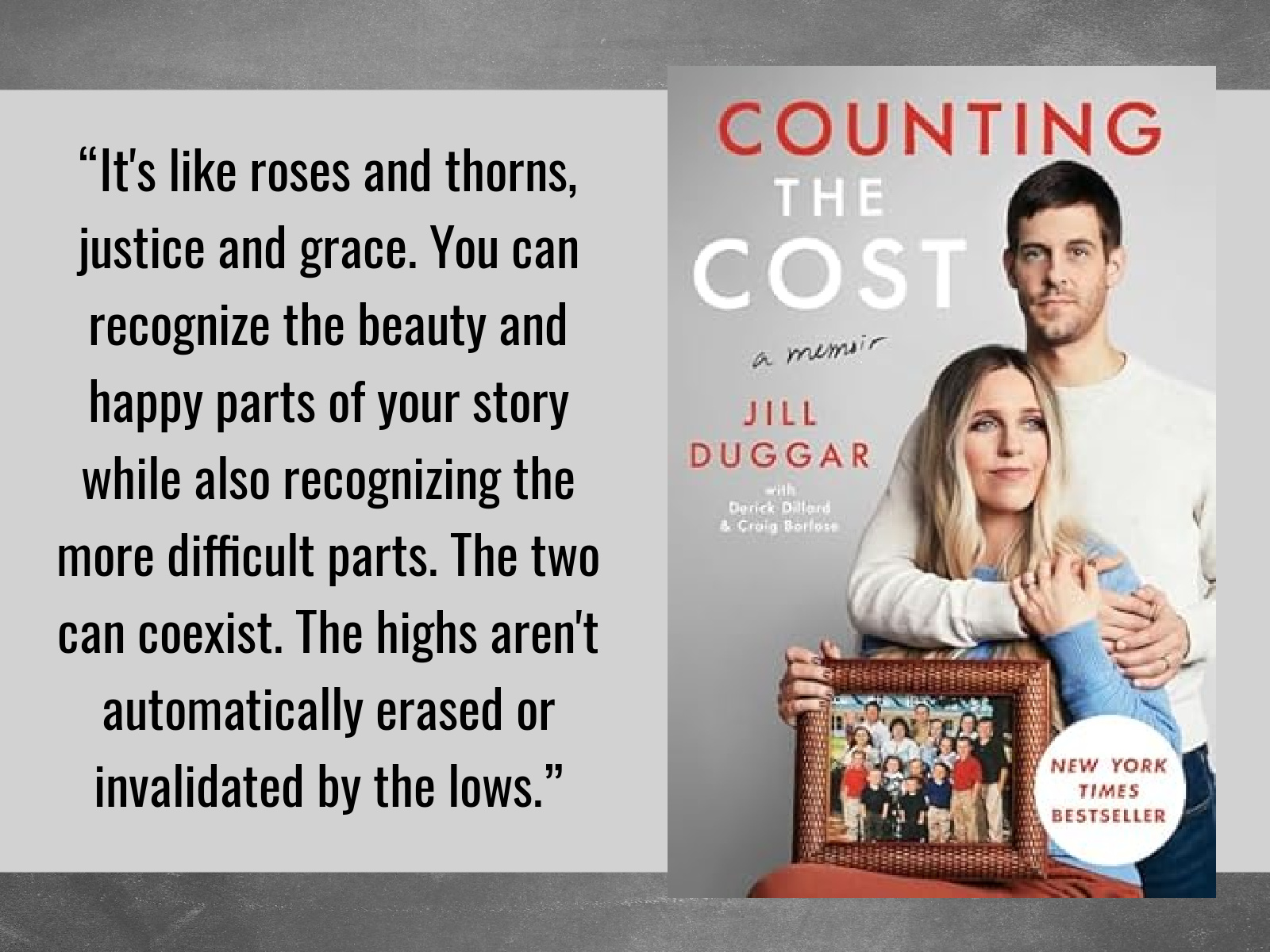
Beyond the Wand: The Magic and Mayhem of Growing Up a Wizard, by Tom Felton: Keeping with a recent theme of reading memoirs from celebrities I knew nothing about is this one from Tom Felton, best known for his portrayal of Draco Malfoy in the Harry Potter movies. The actor never particularly stood out to me in the series (though he is a perfect film representation of the character from the books), but rave reviews of this memoir drew me in and I’m so glad that I gave it a chance!
Following a brief introduction to his close-knit family (he’s the youngest of four sons), Felton shares about his foray into acting and stumbling his way to success by way of the Harry Potter films. A decade of his life was dedicated to filming the popular series and he shares what it was like to grow up on the set, surrounded by acting greats while maintaining a semblance of adolescent normalcy. He also reflects on his experiences of working with the well-known members of the Harry Potter cast, offering nothing but kind words and praise for every single costar, from Ralph Fiennes (his cinematic father, Lucious Malfoy) and Maggie Smith (Professor McGonagall), to Daniel Radcliff, Emma Watson, and Super Grint (aka, Harry, Hermoine, and Ron). I loved hearing about the shenanigans that took place off screen, as well as the actors’ differing styles and how similar and/or different each actor is from the character he or she portrays. I’ve always preferred the Harry Potter books to the movies, but I do enjoy the films and totally ate up this peak behind the filming curtain. Mostly I loved how positive this was, with zero scandal, salaciousness, or vindictive commentary.
This is a memoir and not just a Harry Potter tell-all, so of course Felton discusses life after Potter, which hasn’t always been easy. He shares candidly about his addictions and his time in rehab as well as a lifelong struggle to determine who he is when not on camera and even whether or not the acting life is one for him. I admired his honesty, but what makes this book a standout is his humor. Felton never takes himself too seriously and his writing is jaunty, lighthearted, and quintessentially British.
The book’s final chapters on his life post-rehab were beautiful, and I especially enjoyed the bonus chapter—published since the first version of the memoir was released—in which Felton discusses initial reactions to the book, including many from people who were less than impressed (and many who continue to have no idea who he is!). He comes across as humble, happy, kind-hearted, and very self aware—not at all what I would have expected from the actor who played one of literature’s most reviled child villains. I was shocked to come away from this book thinking I could be great friends with Tom Felton!
This probably won’t hold much appeal to those uninterested or unfamiliar with the Harry Potter franchise, but for HP lovers and those who enjoy a candid but ultimately uplifting memoir, I have nothing but high praise for this one.
My Rating: 4.5 Stars (Rounded to 4 Stars on Goodreads) // Book Format: Audiobook
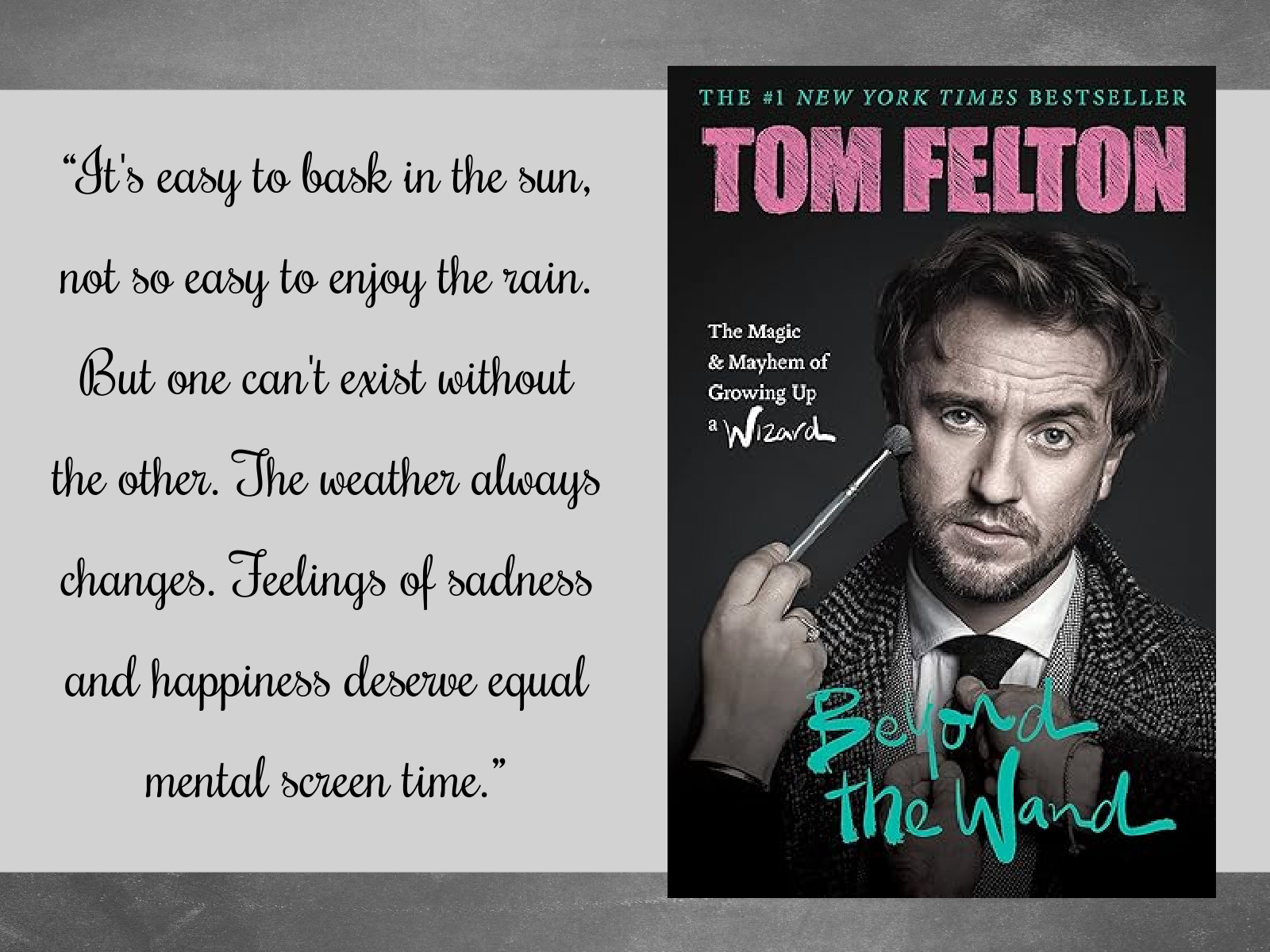
Fighting Words Devotional: 100 Days of Speaking Truth into the Darkness, by Ellie Holcomb: Ellie Holcomb was walking through a difficult season with a friend, trying to help her combat the lies she was hearing and believing. Ellie knew that her friend needed to hear truth, and that the best truth of all comes from Scripture. The two women began memorizing verses together, claiming God’s words as their “fighting words when the enemy [would come] to kill, steal, and destroy.” Together the women began to experience the changes God’s Word can bring when we invite Him into our lives. Though their circumstances didn’t changed, God’s Word changed them “from the inside out because it gave [them] solid ground to stand on when the shame storms started rolling in.”
In this collection of devotionals, Ellie shares one hundred separate passages from Scripture that have become her personal fighting words. Each devotional includes a short Scripture followed by stories of how the verse has been meaningful for Ellie and can apply to our lives, too. Every daily reading wraps up with a few reflection questions and a prayer. I loved the format of this book that was pure Scripture study (and not all that different from my own monthly Bible verse blog posts!). Ellie’s writing is conversational and relatable, with stories that might have been pulled from my own life, and wonderful insights into God’s precious Word and the meaning it holds for us today. Many of the devotionals reference Ellie’s songs (she is best known as a singer/songwriter) and I enjoyed hearing the origin stories of songs I already love.
Some of the devotionals within the book were truly outstanding, and I will always remember them when I come across the correlating verses in my Bible reading in the future. Other devotionals didn’t completely resonate with me, and I wasn’t always entirely on board with the specific interpretations or application of some passages. Mostly, this was a fantastic read and a refreshing daily infusion of God’s Truth. This would be an excellent starting point for women new to Scripture and wanting to begin memorizing and understanding God’s Word; even as a seasoned believer I found hope, encouragement, and important Truth through this book.
My Rating: 4.5 Stars (Rounded to 4 Stars on Goodreads) // Book Format: Kindle
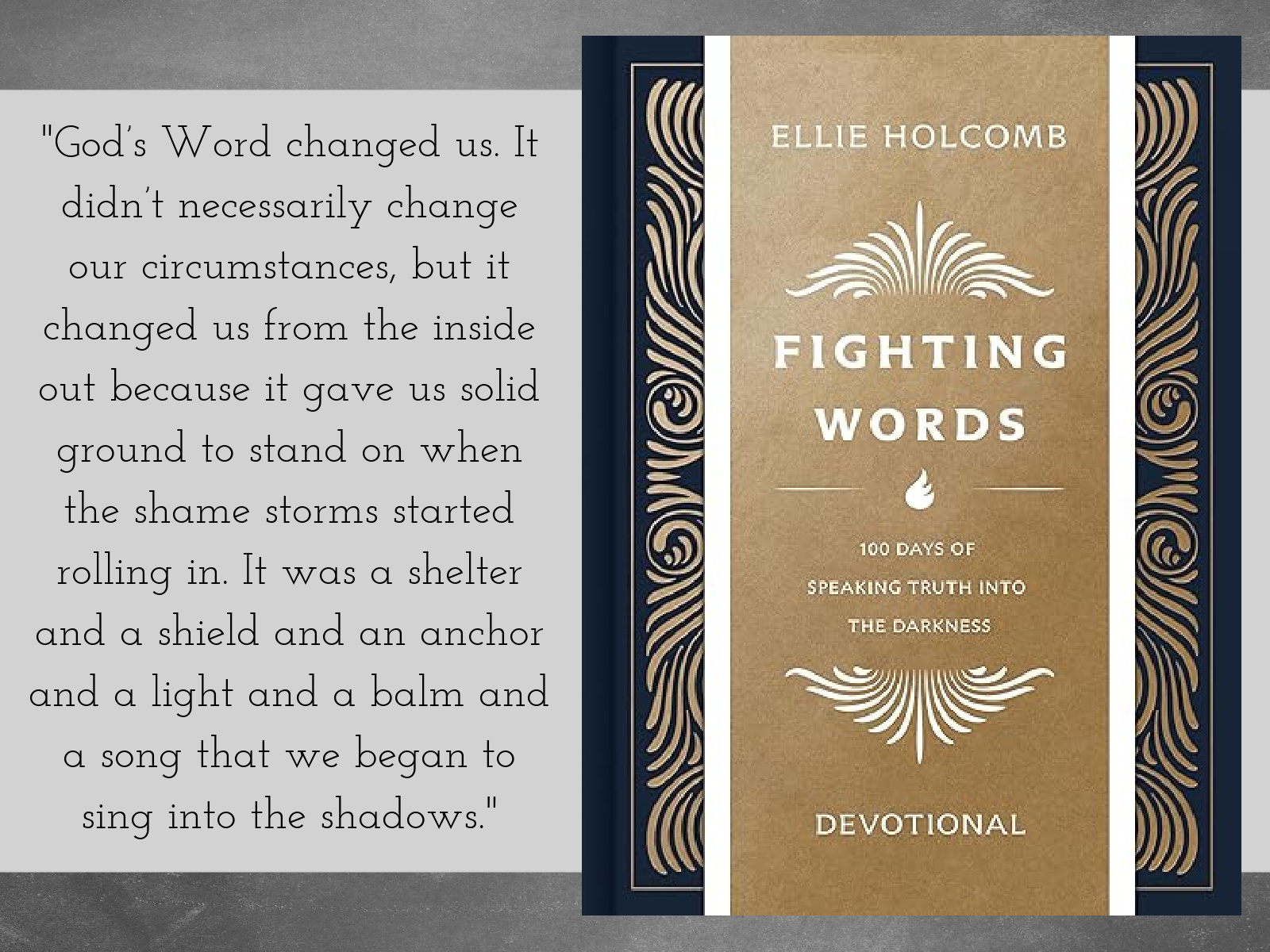
How to Stay Married: The Most Insane Love Story Ever Told, by Harrison Scott Key: When this strangely titled book with the unglamorous cover began popping up around my bookish circles last year, it caught my attention. I’d never heard of Harrison Scott Key, and I can be skeptical of marriage/break up memoirs, but after reading enough rave reviews from trusted readers I put in my library hold . . . and while I waited, I listened to another of Key’s books to get a feel for his writing style. That reading experience left me even MORE intrigued: what would this goofy humor writer have to say about a marriage that seemed (in his previous book) fairly strong? A lot, apparently, as I learned when my library hold came through and I pressed play as fast as I could.
Harrison Scott Key received the shock of his life when his gorgeous wife Lauren—the mother to his three daughters, a faithful church-going woman, and a respected educator—informed him that she wanted a divorce. She was having an affair with the unassuming neighbor, a man Harrison had considered a friend, and she claimed to be completely done with Harrison and their marriage.
Angry and eager for answers, Harrison did the one thing nobody expected: he decided to fight for his marriage. What followed were years of repair, followed by further betrayals and more lows than he and Lauren could have imagined. Harrison uncovered the truths of a marriage that was never as it seemed, forcing him to confront his own shortcomings as a husband and reconcile misperceptions of his wife and family with their broken reality. The experience also shed light on his faith, drawing him closer to the heart of a God he’d always doubted and proving that miracles are possible—even when (especially when) we aren’t expecting them.
This book shocked me, more than once: not just with the specifics of Harrison and Lauren’s marriage, or the sheer vulnerability in their storytelling, but with Harrison’s commitment to his wife and marriage in a situation that seemed utterly doomed. I admired his loyalty and willingness to go to every length possible to save his marriage—an absolute anomaly in a culture that is ambivalent towards commitment and lasting relationships. I was also shocked by Harrison’s ability to maintain a lightness to this tragic story: he somehow brings his trademark humor to every story, even the painful ones, in a way that makes the heartbreak more palatable without minimizing the sadness of the narrative.
Perhaps the biggest shock of all came at the end of the book, when Lauren herself makes an appearance to share her side of the story. I can’t imagine the courage it must have taken to open up about her infidelity, and her contribution to the book did away with any doubts I may have had that this is a couple who really does love each other and, against all odds, will strive to make their relationship work. They are a messy and broken couple, and still we see so much hope in their story.
I greatly appreciated this look at a marriage in peril: Harrison and Lauren’s story is absolutely different from anything I’ve experienced in my own marriage, but it was helpful to walk through the history of their marriage and see the small fractures that led to a massive break. How to Stay Married left me thankful for my husband and more committed to “us” than ever before.
My Rating: 4.5 Stars (Rounded to 4 stars on Goodreads) // Book Format: Audiobook
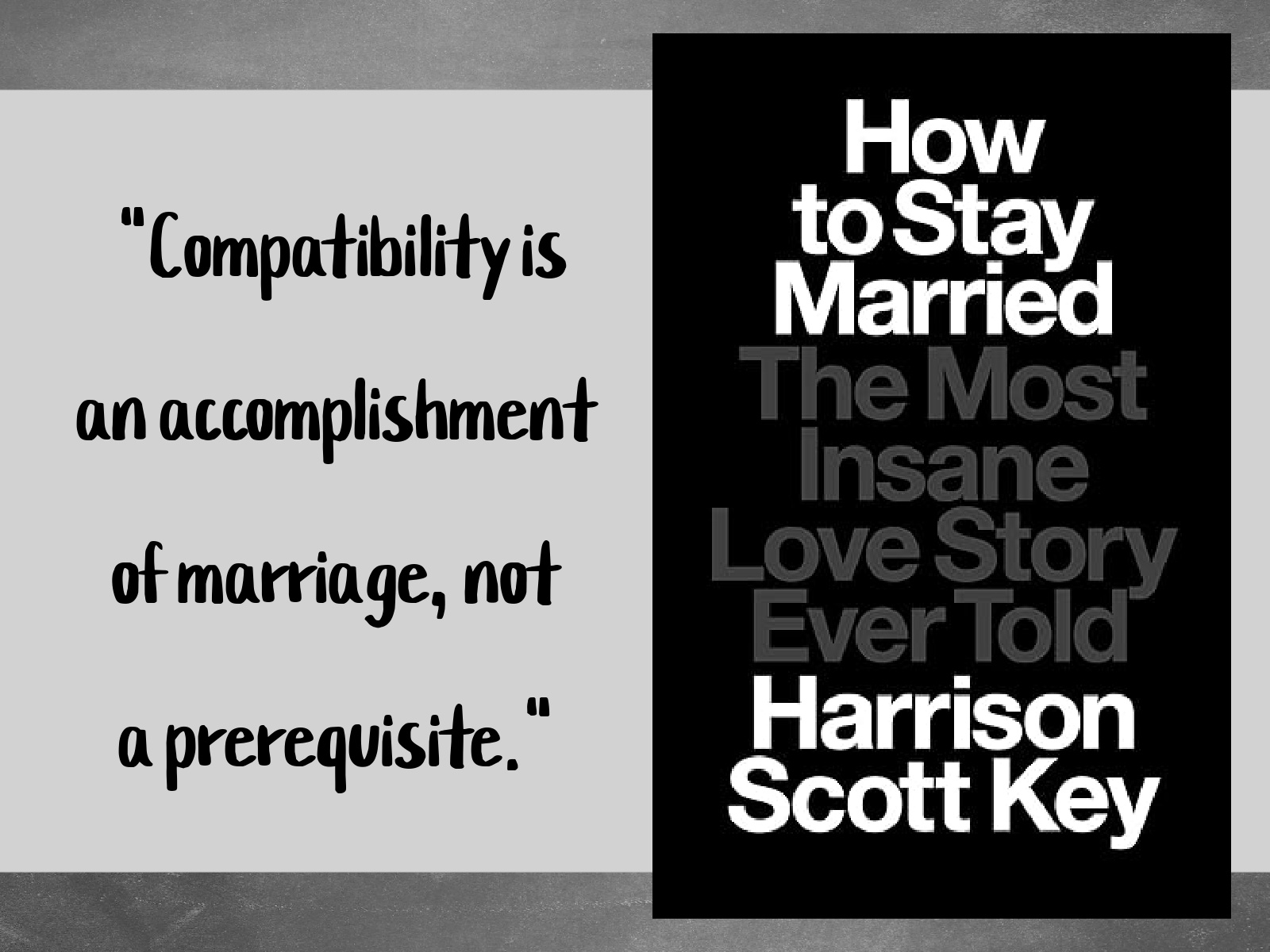
The Cranky Mom Fix: How to Get a Happier, More Peaceful Home by Slaying the “Momster” in All of Us, by Becky Kopitzke: In my idealized image of my own life, I am a mom who is always patient, present, and relaxed with my children. I never raise my voice, never lose my temper, and never have anything but soothing, kind words to offer my children. But that “ideal mom” doesn’t exist, at least not in my own home. I am frequently on edge around my children, I loose my patience (and verge on losing my sanity), and I am rarely the soothing, even-tempered presence I’d like to be.
In The Cranky Mom Fix, fellow-frazzled-mom Becky Kopitkze meets us cranky moms where we are at, but refuses to let us stay there. Kopitzke reminds us that our attitude is a choice and she sets us on a path to choosing positive attitudes and not cranky ones in a an approach that involves identifying our triggers, knowing when we have reached ur limits (and what to do when that happens), and practicing healthy self care so that we can better care for our kids. She also helps moms create environments that are less likely to make us cranky, showing us how to connect with our kids, exercise healthy and effective discipline, and foster a FUN environment in which we prioritize Forgiveness, do the Unexpected, and Nurture our kids’ interests.
This was the right book at the right time for me, in a season when I’ve been more than the usual amount of cranky. Kopitkze validated my experience as she shared her own cranky moments, helping me remember that I am not a horrible mother for not always feeling cheerful and upbeat. I also needed the reminder that feeling cranky doesn’t mean I need to ACT cranky and I found her suggestions actionable and effective. I liked her engaging, conversational writing style that is filled with anecdotes and relatable moments, and I really appreciated the heavy reliance on Scripture and Biblical principles that can guide us in our parenting and our general approach to life. Some reviewers have expressed disappointment over the heavy amount of theology; for me, this was a feature and not a flaw.
If you’re a mom who could use a slight attitude adjustment, this is an easy-to-read book that just may offer the help you need.
My Rating: 4 Stars // Book Format: Audiobook
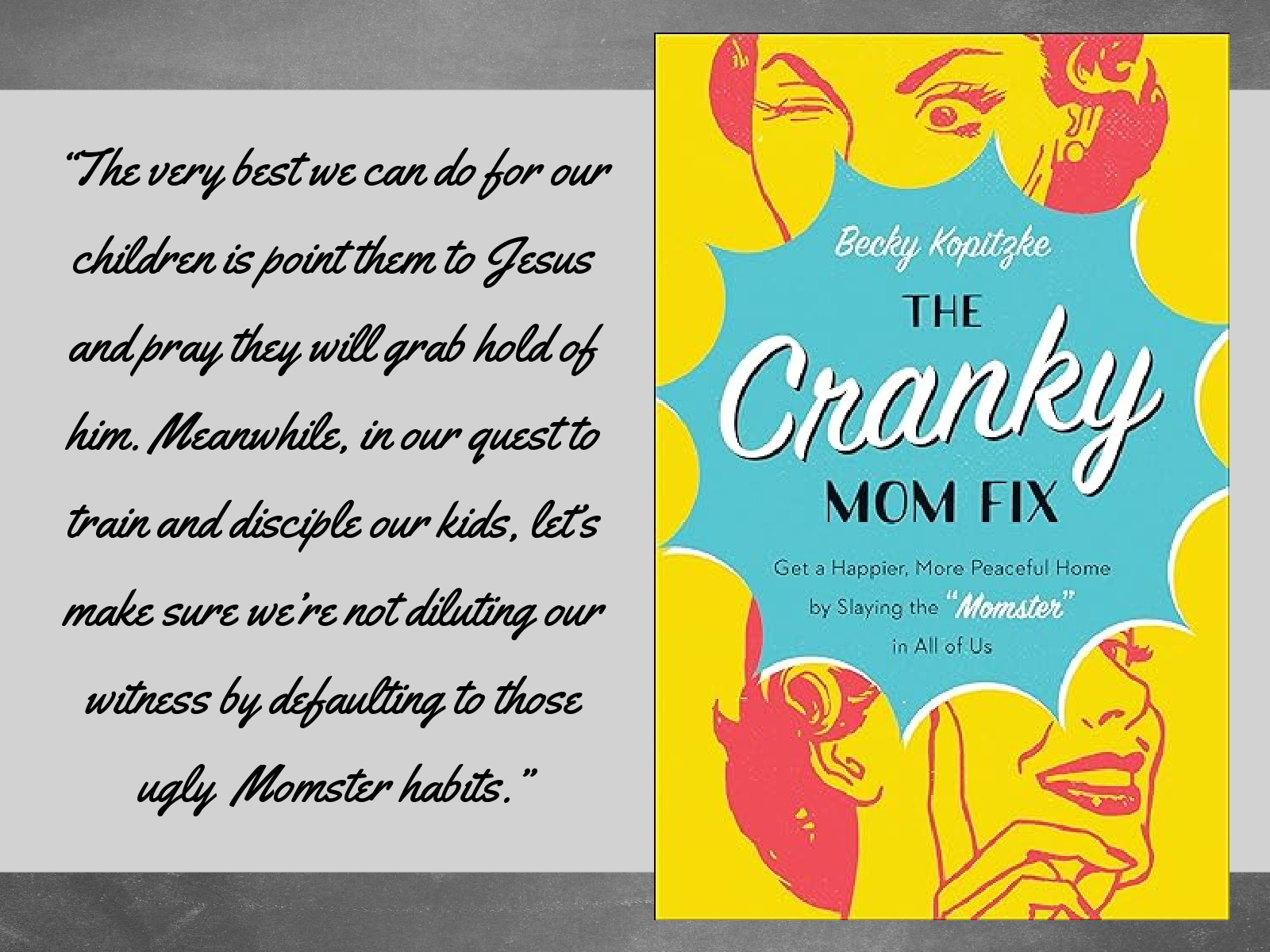
The Cook’s Book: Recipes for Keeps & Essential Techniques to Master Everyday Cooking, by Bri McKoy: Fifteen years ago, when Bri McKoy’s husband suggested one night over takeout that perhaps they should learn to cook, she laughed in his face. Bri grew up with a mother who cooked but had always prided herself on her INEXPERIENCE in the kitchen. But Bri took her husband’s suggestion under consideration and headed to Barns & Noble, returning home with a copy of The Cooking Light Cookbook (because she assumed that this meant the cooking would be light, as in easy). Before long she had cooked through the book and mastered the art of following a recipe, yet she still lacked confidence in the kitchen. Over time she learned that there was more to cooking than copying a recipe: “a recipe is an excellent compass, but when we step into the kitchen we become the navigators. The compass is only helpful if we know how to navigate our own kitchen.”
In The Cook’s Book, Bri shares her hard-earned wisdom on learning to navigate a kitchen. She begins by helping home cooks create a functional kitchen with suggestions for tools, appliances, and pantry staples every cook needs, as well as a framework for helping kitchen newbies cast a vision for their real kitchen. In subsequent sections Bri teaches us necessary tricks, such as how to deglaze a pan and cook food without having it stick (I needed this section!); how to use all five senses when cooking; and how to select and use a proper knife. There are also sections on meats, soup, sides, sauces, flavor building, and food & wine pairings, with each section providing a varied selection of recipes in addition to important tutorials on things such as selecting the right cut of meat and knowing which sauce to use with which food items.
I enjoyed the conversational tone of this cookbook and appreciated Bri’s gentle, informative approach for helping newbie chefs gain confidence in the kitchen. Like Bri, I taught myself to cook from a cookbook shortly after getting married, but I still find myself at the “read the recipe” stage and had several helpful takeaways about how to begin branching out with my cooking. This book, which I would recommend for home cooks with at least some familiarity with cooking (this is not really a beginners cookbook) was just my speed and would make a great housewarming or wedding gift for other new-ish cooks wanting to up their cooking game.
While I loved the premise and setup of this cookbook, I would have liked more photographs (including some step-by-step photos of some of the more difficult recipes). And though I’m sure many will appreciate the books detailed tutorials on stocking a home bar cart and paring wines with various dishes, these chapters were of no interest to me as I do not drink or serve alcohol. (I did learn some interesting wine trivia, though!)
While this won’t be a forever favorite cookbook for me, I enjoyed reading it cover to cover and have already bookmarked quite a few recipes to try in my own kitchen.
My Rating: 4 Stars // Book Format: Print
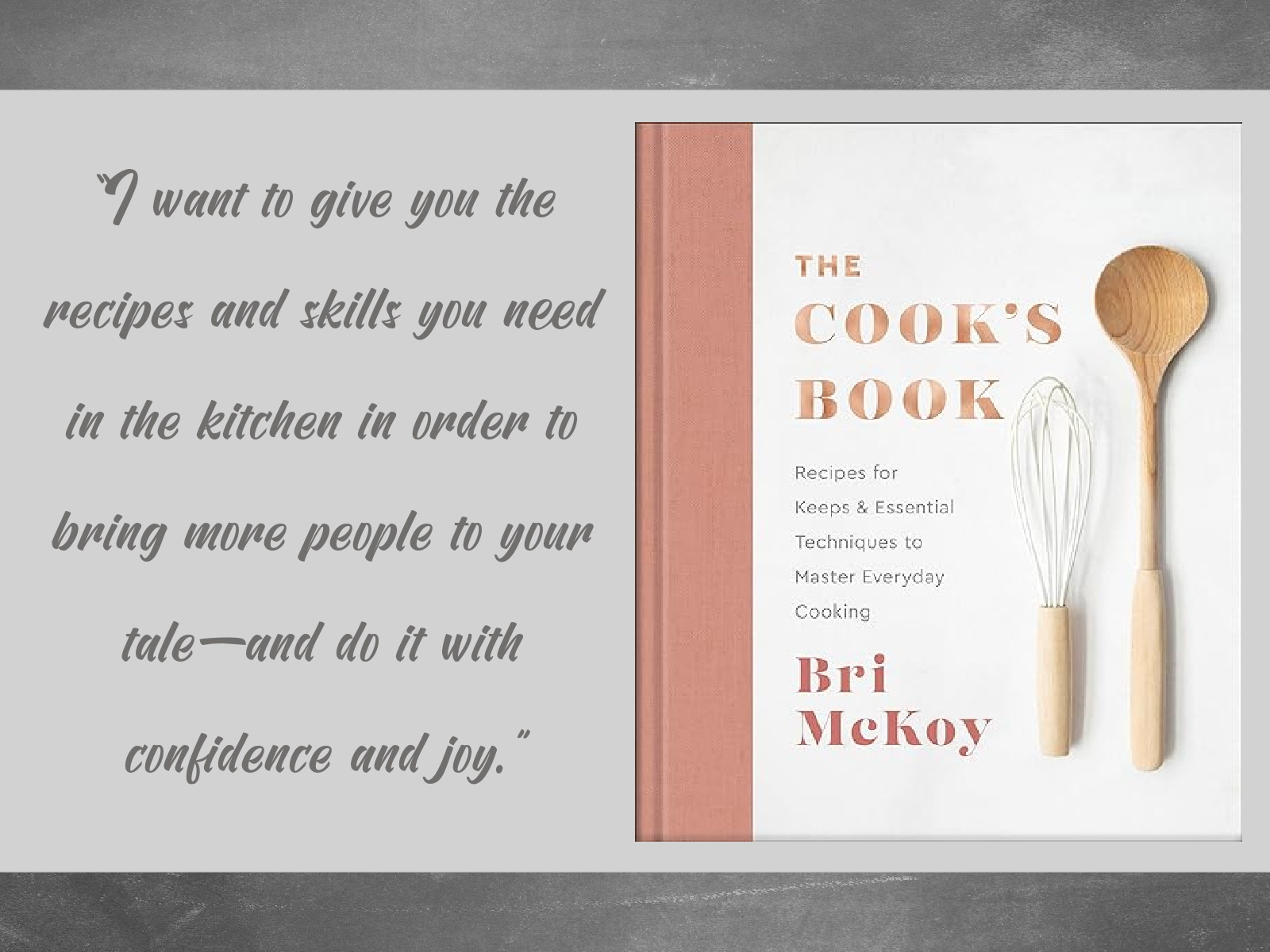
Happy-Go-Lucky, by David Sedaris: It’s difficult to describe David Sedaris’s brand of humor for those who are not familiar with the comedian: he is self-deprecating but also snarky and brutally blunt. His soft-spoken delivery and aw-shucks demeanor add to the shock value of jokes that are often crass and tell the whole truth of a story, despite assumed common courtesies and general levels of what is expected or acceptable: Sederis is unafraid to cross the line with his storytelling which, though often very offensive, is exactly what makes it so funny.
I’ve not read all of Sedaris’s books, but am familiar with him and his work and was excited to listen to this collection of essays about his experience during the COVID pandemic. Sederis describes the eeriness of a vacant city and frustrations of mask-wearing, the affect the pandemic had on his life with his partner, Hugh, and his observations of some of the absurdities of the pandemic that few have been willing to call out. And as the world opens up, he remarks on the changes he witnesses in his downtrodden audiences and in his newly-confident self. Between pandemic (and pandemic-adjacent) essays, Sederis reflects on the recent death of the father with whom he had a complicated relationship, and riffs on what it is like to be orphaned as a senior citizen as he commemorates the loss of a man he never loved.
Sedaris covers ALL the hard stuff in this collection, from child abuse and addiction to societal breakdown and cultural upheaval. Objectively, the content here is far from funny, yet despite this undercurrent of sadness, Sedaris keeps us laughing all the way through. His observations are ridiculous and absurd—not because they are unrealistic, but because they speak the truth of this bizarre and ridiculous world we find ourselves in. This book is not for the easily offended: Sedaris gets very political (with most criticism aimed at Conservatives, though he is unafraid of poking fun at Liberals too), and he is critical and mean-spirited towards many, including his own family members. Some essays are more biting than others and left me feeling uncomfortable, but as a whole this essay collection defies the darkness of its subject matter to live up to its tongue-in-cheek title.
This book, as with everything by Sedaris, is best on audio. The humor of these stories is largely in the delivery, and Sedaris’s is spot on. Many of the essays were recorded in front of a live audience, adding to the communal nature of these stories meant to be shared.
My Rating: 4 Stars // Book Format: Audiobook
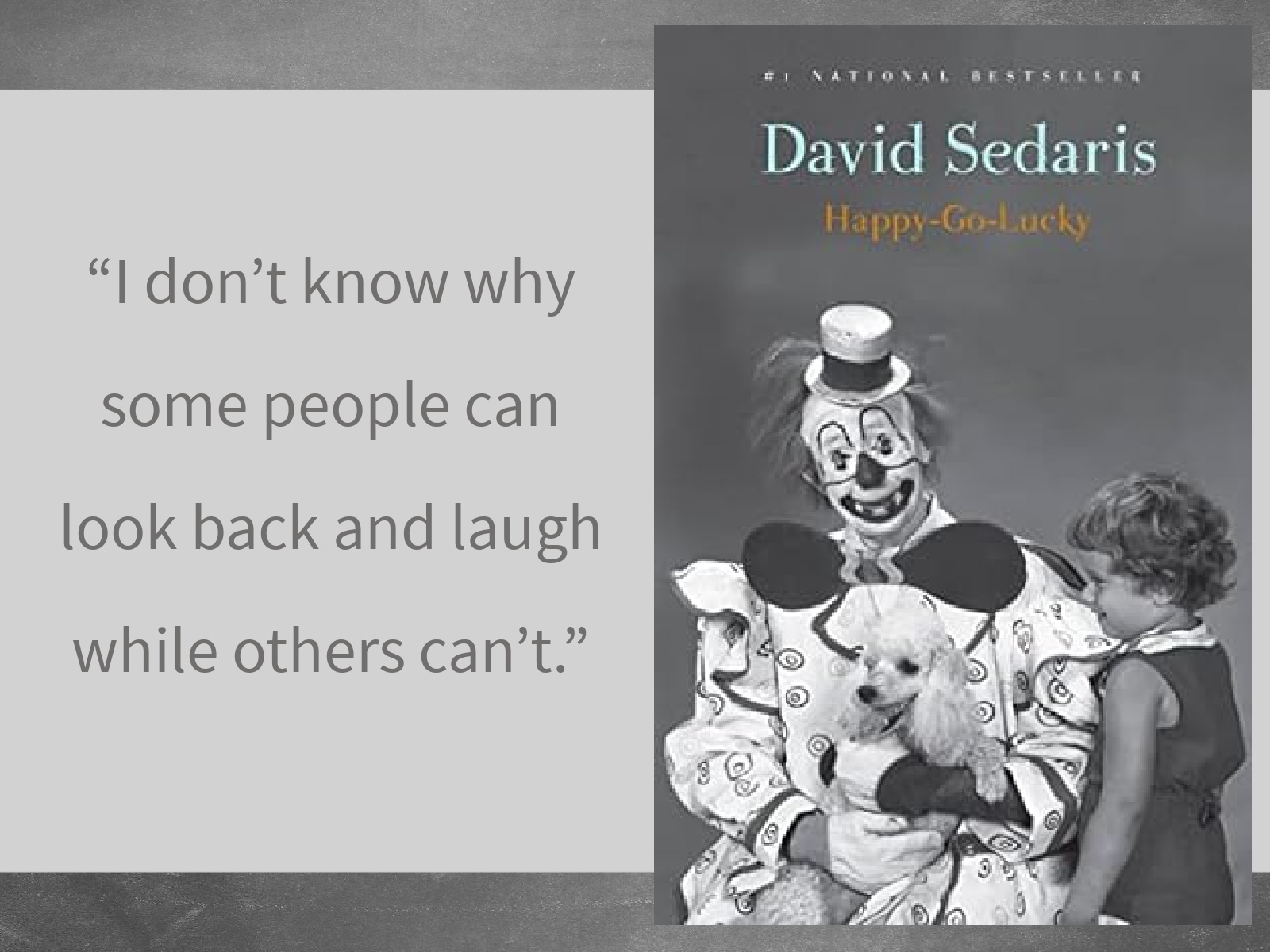
FICTION
All the Lonely People, by Mike Gayle: Hubert Bird is a widowed octogenarian whose simple life revolves around watching television with his cat, reminiscing about his life (from his early childhood in Jamaica to migrating to London, meeting the love of his wife, and raising their two children), and his weekly phone calls with his daughter, Rose, who lives in Australia. In those phone calls Hubert paints a picture of a vibrant social life, but the lies mask a lonely existence he’s too ashamed to expose to Rose.
When Rose announces that she will be returning to England for a visit, Hubert is faced with the task of making his real life align with the fictional one he’s created in their phone conversations. Hubert sets out to make new friends and along the way discovers that his town is filled with lonely people. From the single young mom and her daughter who live next-door, to the deliveryman who recently arrived in England from Eastern Europe, to a fellow senior who is also seeking companionship, Hubert is suddenly surrounded by unexpected friendship. And this motley crew is determined to end a loneliness epidemic that has spread throughout their town. Hubert is cautious about his newfound happiness and connection: is it too good to be true? Can Hubert bring an end to not only his own loneliness, but that of countless others?
If you’re looking for a book that delivers on all the feels, this is it. It’s a curmudgeon story focused on found family and second chances, and each new connection brings emotion as well as delight. The book follows a dual timeline, with alternating chapters sharing Hubert’s life going back to his arrival in England in the 1950s, and we follow is beautiful but ultimately tragic love story that is marked by faithfulness and sacrifice but also burdened by racial tension (Hubert and his wife are a biracial couple, which was far less acceptable in that time), the challenges of raising rebellious children, addiction, and financial strain. These pieces all come together to show how Hubert became so lonely, and his decent into isolation is heartbreaking and uncomfortably relatable.
While this is certainly a feel-good story, it is neither saccharine nor trite. There are a number of plot twists I did not see coming, and every character is vibrant and easy to root for. There were parts of the book that dragged a bit for me, and Hubert’s Jamaican dialect took some getting used to, which (combined with an ending I really didn’t like) is ultimately why this was not a 5-star read, but it was a sweet and memorable book with lovely messages and a cozy, warmhearted vibe.
My Rating: 4.5 Stars (Rounded to 4 Stars on Goodreads) // Book Format: Kindle
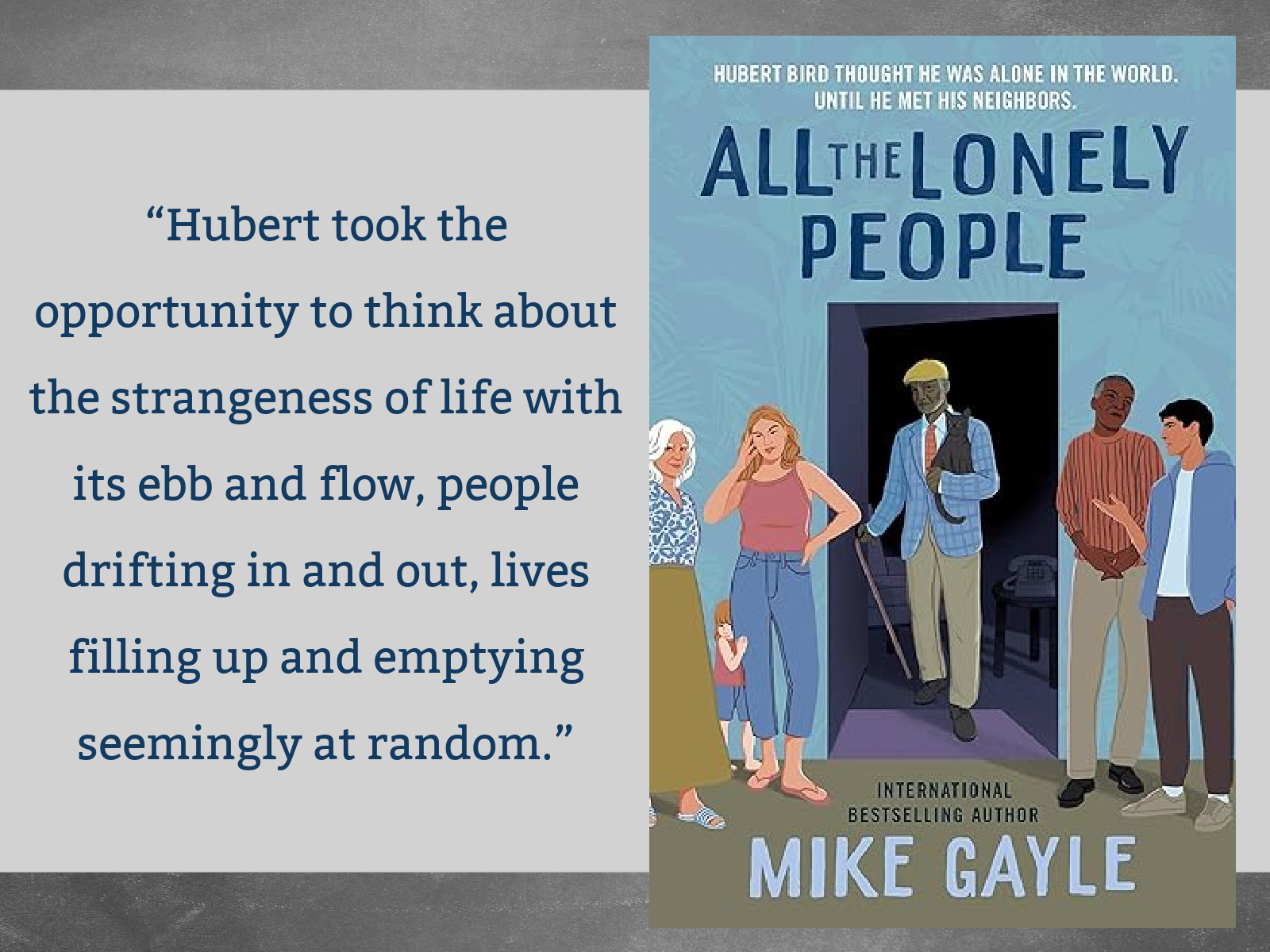
The House of Love and Death, by Andrew Klavan: Cameron Winter is nothing more than a middle-aged English professor—or so he would have everyone believe. Despite years of therapy and concerted efforts to separate from his mysterious former life as a government assassin, Winter can’t forgive himself for past sins or abandon his ingrained sense of justice and his intuition around crime. After reading a news story about a wealthy family murdered in their home in the Chicago suburb of Maidenvale, Winter can’t resist the opportunity to exercise his “strange habit of mind” (his ability to mentally reconstruct and analyze a crime scene).
Winter’s arrival in the Maidenvale is not a welcome one. He knows the facts of the case—that three members of the family, along with their live-in nanny, were pulled from the burning mansion, already dead from gunshot wounds. But Winter is uncomfortable with the town’s immediate assumption that the boyfriend of the murdered teenage daughter is the guilty party, and the police are not receptive to Winter’s questioning of their own narrative around the crime. As he spends more time in Maidenvale, Winter uncovers layers of corruption, darkness, racial tension, and utter evil existing beneath the town’s pristine facade. The town’s dichotomous layers mirror those in Winter’s own life, and his pursuit of justice in the Maidenvale murders leads to an uncovering of deeply uncomfortable truths about himself and his quest for forgiveness, acceptance, and love.
This is the third in the Cameron Winter series, and though it could technically be read as a standalone, I would recommend reading the series in order as each book reveals spoilers from earlier in the series. And you WILL want to read this whole series that blends fantastic storytelling and suspense with poignant insights into the human psyche. Cameron Winter has become one of my favorite fictional protagonists: he is complex, with the mind of a hardened assassin, the soul of a poet, and the heart of a wounded child. His backstory—which unfolds across the arc of the series, largely told through sessions with his therapist—is intriguing and unexpected, and Winter himself would outshine the primary mystery of each novel if those mysteries were not equally unique and compelling.
I know Andrew Klavan from his Conservative podcast with the Daily Wire and always appreciate his heterodox take on modern society, culture, and politics, with ideas that prioritize Truth over alignment with party ideology. Klavan brings this perceptiveness and artist’s spirit to his writing that is filled with third-rail themes without becoming preachy. The books in this series get to the core of what it is to be human, grappling with the fallenness of human nature and still pursuing light within the darkness. Book 1 remains my favorite of the series, but this one is also excellent (minus some confusing time hopping and more than the normal amount of arrogance from Winter), and I’m already itching to read book 4.
My Rating: 4.5 Stars (Rounded to 4 Stars on Goodreads) // Book Format: Kindle
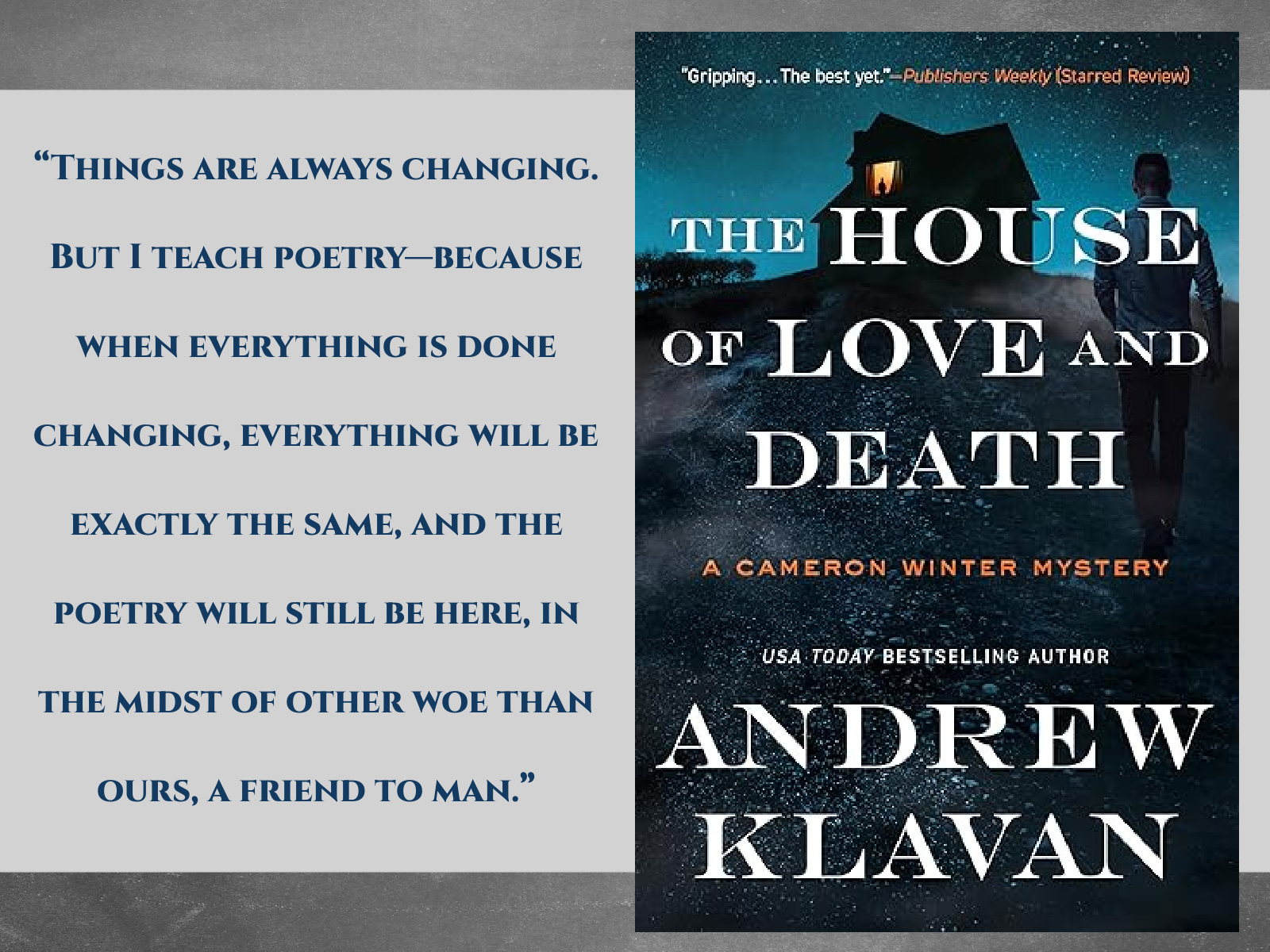
Gentle Ben, by Walt Morey:The Alaskan wilderness is not an easy place to grow up, and since the death of his older brother, Jamie, thirteen-year-old Mark Anderson has been in need of a friend. That friendship arrives in the unexpected form of an Alaskan brown bear named Ben who has been held in captivity by the town bully since he was a cub. Everyone else is afraid of Ben, but Mark’s parents recognize their genuine connection and consent to adopting Ben as the family “pet.” But owning a bear isn’t easy: Mark must tend to Ben’s lodging, provide food (paid for with money he earns on dangerous excursions with his dad in their fishing boat), and—most difficult of all—must convince the town that Ben’s life is one worth preserving.
This classic adventure story was our family read-aloud for January and it has everything a parent/teacher could want in a book for young boys: a brave and compassionate protagonist, gorgeous descriptive prose, a great sense of place in an exciting setting with plenty of dynamic plot turns, and strong themes of courage, loyalty, resilience, kindness, redemption, and friendship. This book was harder and sadder than I’d anticipated and does not shy away from the harshness of life on the Alaskan frontier; some parts were a little scary for the kids (and a little tender for me!) but we all enjoyed this memorable book that’s earned its spot among Children’s Classics.
My Rating: 4 Stars // Charleston’s Rating: 4.75 Stars // Book Format: Print
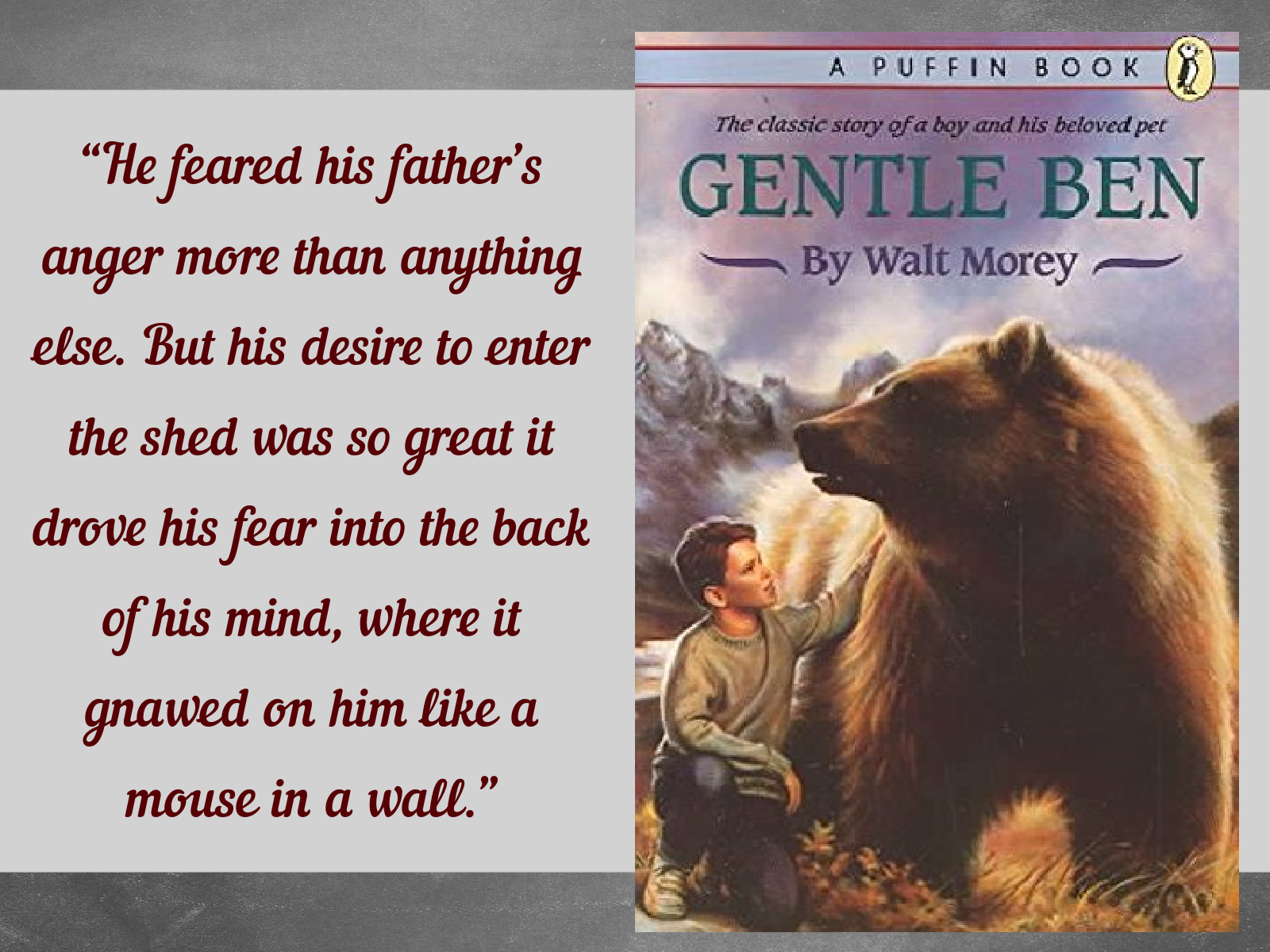
Go As a River, by Shelley Read: In 1948, seventeen-year-old Victoria Nash runs the household on her family’s peach farm in the small town of Iola, Colorado. Following the tragic deaths of her mother, aunt, and cousin, Victoria is the only surviving woman in a home of brutal, broken men, but she obediently tends to the family home, keeping the family men (her deadbeat brother, cruel uncle and bereaved father) and field workers fed between hours spent harvesting peaches. When an alluring young man named Wilson Moon passes through town, Victoria is smitten and it seems as though happiness and a new life may lie in her future. But when Wil, a Native American, becomes a wanted man in town, their romance must be forced into the shadows. Then tragedy strikes and Victoria must leave home, fleeing to the harsh mountains outside of town where she must learn to survive on her own.
As its title suggests, this story line does not follow a straightforward path but meanders like a river, flowing between settings and time periods and genre. At its beginning I assumed I was reading a love story, which morphed into survival story, then a decades-long saga of a strong but wounded woman making a way for herself and her beloved peaches in every way she can. This is a story of immense hardship and loss, loneliness and discouragement, and bitter grief. It is also a tale of resilience, courage, unexpected friendship, and found family.
I had massive expectations going into this book that, sadly, were not met. I will say that I didn’t hate this book or even dislike it; the writing is gorgeous, with stunning depictions of nature, farm life, and wilderness survival, and poignant passages of introspection and palpable emotion. I enjoyed the post-World War II setting that gave me a feel for the hard times many endured as a result of the War. And I really loved the peaches, though the story had me salivating for fresh peaches—not ideal as I read this in the dead of winter.
Despite so much to love, this book was far too sad for me to enjoy. Victoria faces one hardship after another and at some point it became too much for me, and also slightly unrealistic. The book has been compared with Where the Crawdads Sing and The Four Winds, two other books that I found to be weighted down by too much sadness and not enough redemption. Also, though the writing is incredible and many of the side characters are very well drawn, I never felt like I really knew Victoria, despite the story being told from her perspective. She felt flat to me and though I admired much in her character, I could never quite picture or relate to her.
I’m glad I read this, and the story will sit with me for a long time, but it definitely wasn’t the favorite I had hoped it would be. I do think it would make an excellent book club selection, and for fans of tragic historical fiction it may just be the delicious peach of a book you are craving.
My Rating: 4 Stars // Book Format: Kindle
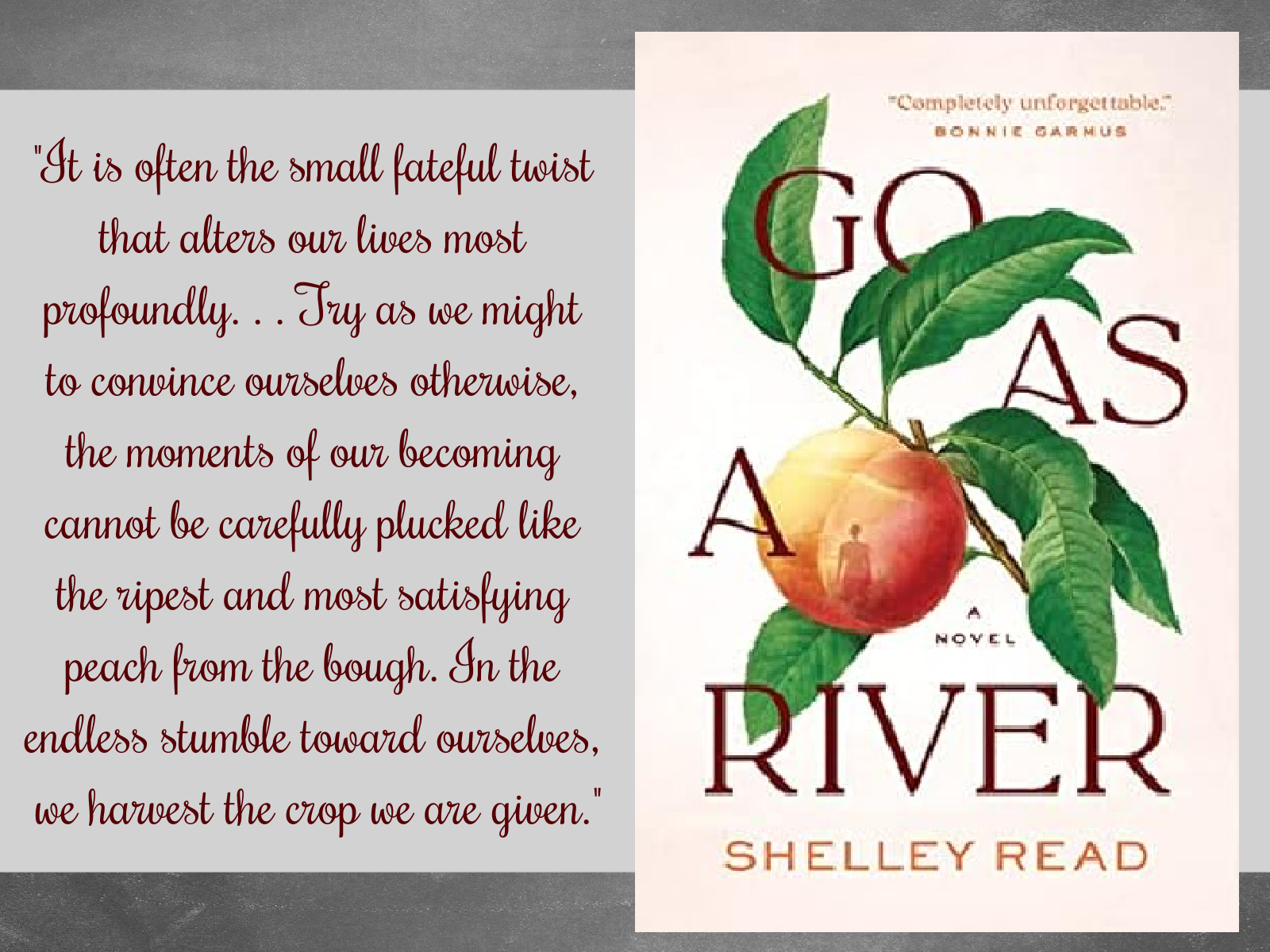
Joan is Okay, by Weike Wang: Joan is the thirty-something daughter of Chinese parents who came to America to give their children the best opportunities for happiness and success, then returned to China themselves once those children were grown. Joan now lives alone in New York City and is a dedicated ICU doctor. Joan’s coworkers, neighbors, and family members seem surprised and even critical of her lack of a social life and deep commitment to her work, but Joan loves that her job gives her the chance “to feel pure and complete drudgery in [her] pursuit of use.” For her, being in the trenches is an utter delight.
Then Joan’s father passes away, and after a two-day roundtrip to China for the funeral, Joan is eager to return to her version of normalcy. But soon a series of events leads to a forced sabbatical in which Joan must confront uncomfortable truths about her life that is “different” (though she hates that word) from everyone else’s. Joan grapples with questions of identity, belonging, incompatible cultures and ideals, and the definition of a meaningful life.
This is an odd little book that is highly literary (much of it went over my head) but also insightful and thought-provoking. I enjoyed observing the world through Joan’s perspective that is clinical, literal, straightforward, and naively brilliant. Much like Wang’s previous novel (which I preferred to this one, probably because I read it first), this pulled back the curtain on a culture that is different than mine, helping me understand how love and sacrifice and concern can take different shapes, and happiness does not need to be one-size-fits-all.
This it technically a Covid novel as it takes place in the very early months of the pandemic and touches on the chaos and confusion surrounding the earliest days of 2020. I was impressed with Wang’s thoughtful and mostly apolitical handling of this delicate time and subject matter. (Those who are squeamish around medical issues can be assured that there is little page time spent “in the trenches” with Covid patients, and that these scenes are touching but not graphic.)
I enjoy Wang’s writing style that is spare and subtly humorous. The odd sentence structure and lack of quotation marks may bother some, but in this instance I found them to add to the tone and messaging of the novel. This is a quick read that I’d recommend to fans of quirky characters and books that offer unconventional perspectives on some of life’s biggest issues.
My Rating: 4 Stars // Book Format: Print
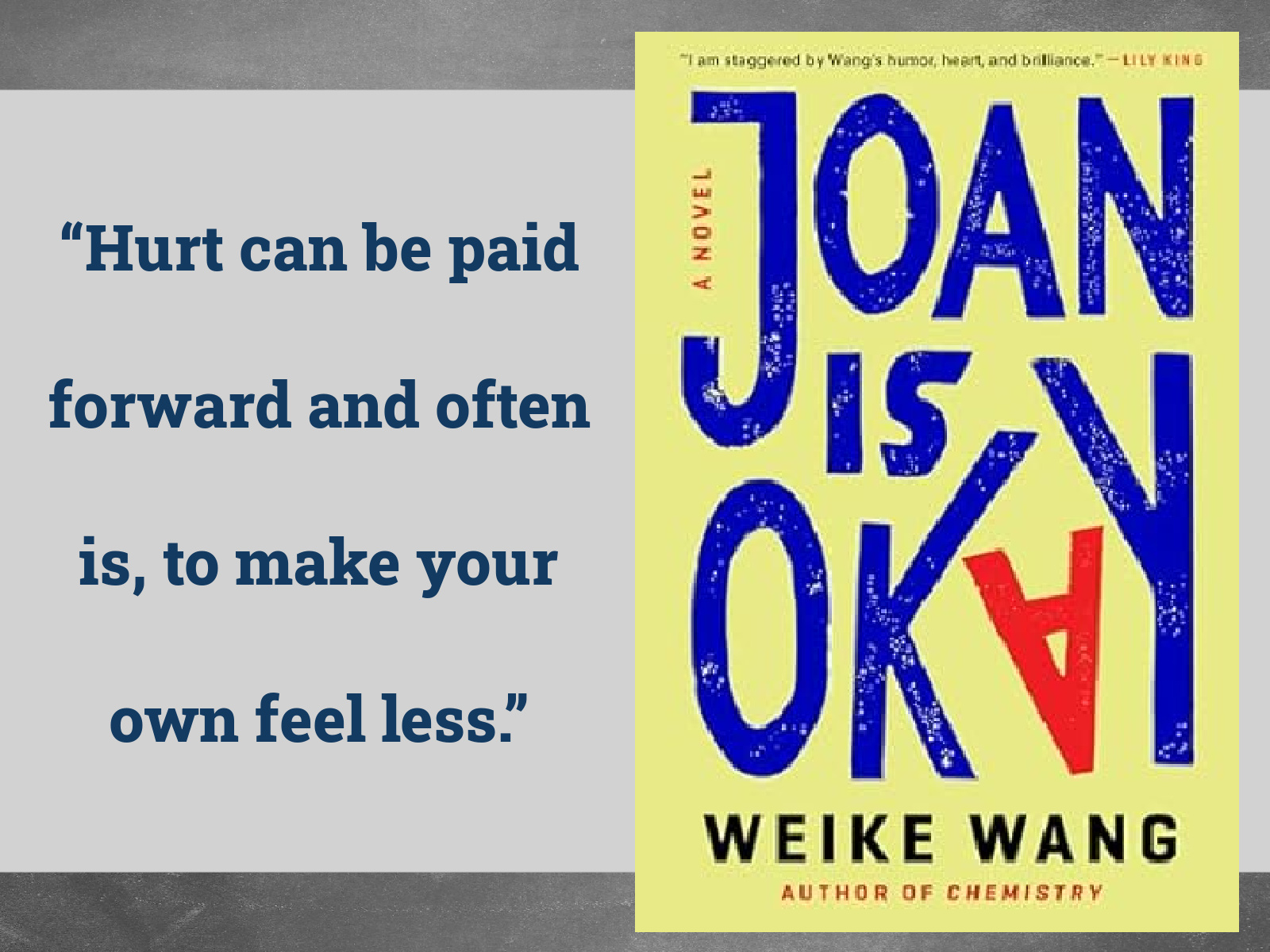
Have you read any of these titles? As always I’d love to hear your thoughts!
I read a previous book by Bri McCoy (Come and Eat) and enjoyed it (several recipes from that book are mainstays) so I need to look into The Cook’s Book! How To Stay Married sounds intense! I am intrigued but also feel like it would be emotionally draining to read, so I need to find the right time! I loved Fighting Words, especially since some of the verses in the books were on Ellie’s Memory Monday Youtube Shorts, so I would memorize them using the super short Scripture song. John 10:10 was my favorite and my 4 year old son loves singing it too!
Go As A River is our book club choice this month. I can’t wait to discuss it next week. I absolutely loved it.
I’m glad that you liked it! Even though it wasn’t a favorite for me, I think it would be excellent for a book club discussion!
Love Ellie Holcomb. The recipes in the Cook’s Book are really good! Need to sit and read through it, but I’ve made 8 recipes that all turned out well. I put Go as a River Down after the first major tragedy/ violence. My favorite Sedaris is Calypso- Happy Go Lucky didn’t work as well for me. Congratulations on the baby!
Unfortunately those tragedies in Go As a River kept coming! I haven’t made many of the recipes in The Cook’s Book, but it was such a fun read.
You got some really GOOD reading done this month! I’ve been curious about Ellie’s devotional because I appreciate her voice (not just singing, but otherwise). And my kids listen to Andrew Klavan’s podcast, so I’m interested in his fiction. Possible gift option!!
If you like Ellie’s music, you’ll love the devotional since it includes so many of her lyrics. I imagine anyone who enjoys Andrew Klavan’s podcast will like his books, too!